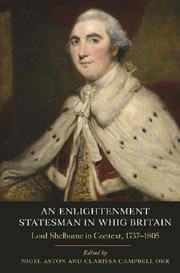Book contents
- Frontmatter
- Contents
- List of Illustrations
- List of Contributors
- Acknowledgements
- List of Abbreviations
- Introduction
- Part One Family, Piety, and Finance
- Part Two Politics
- 5 Shelburne: A Chathamite in Opposition and in Government 1760–82?
- 6 Shelburne and Ireland: Politician, Patriot, Absentee
- 7 Lord Shelburne's Ministry, 1782–3: ‘A Very Good List’
- 8 Shelburne, the European Powers, and the Peace of 1783
- Part Three The Bowood Circle Revisited
- Index
- STUDIES IN EARLY MODERN CULTURAL, POLITICAL AND SOCIAL HISTORY
5 - Shelburne: A Chathamite in Opposition and in Government 1760–82?
from Part Two - Politics
Published online by Cambridge University Press: 05 September 2013
- Frontmatter
- Contents
- List of Illustrations
- List of Contributors
- Acknowledgements
- List of Abbreviations
- Introduction
- Part One Family, Piety, and Finance
- Part Two Politics
- 5 Shelburne: A Chathamite in Opposition and in Government 1760–82?
- 6 Shelburne and Ireland: Politician, Patriot, Absentee
- 7 Lord Shelburne's Ministry, 1782–3: ‘A Very Good List’
- 8 Shelburne, the European Powers, and the Peace of 1783
- Part Three The Bowood Circle Revisited
- Index
- STUDIES IN EARLY MODERN CULTURAL, POLITICAL AND SOCIAL HISTORY
Summary
The political career of William, Earl of Shelburne has for two centuries been as much of an enigma to historians as it was to contemporaries. Indeed, Shelburne remains a controversial character and he is remarkably difficult to place. No agreed and coherent interpretation of his political career exists, perhaps because it is by no means easy to integrate the different elements in Shelburne's background into a consistent interpretation of his political life: his Irish origins, his early military career, his fascination with the law, his Christianity, his free trade principles, his Whiggish elitism, and not least, his ambition. Furthermore, it was not so much Shelburne's unprepossessing personal attributes – his yearning to be liked, his need to be admired and respected, his unctuous flattery, his propensity to bully and domineer – which caused him to be mistrusted but the fact that he appeared to lack consistent political direction and singleness of purpose, or as Edmund Burke noted, he appeared to lack ‘a uniform rule and scheme of life’. His liberalism has interested recent historians but relating his career to a nineteenth-century paradigm of political change may be less helpful than to locate him within one which he, and his contemporaries, would have recognized. Probably the most important of the central threads of Shelburne's political career in these years was his attachment to the ideas and attitudes of the Elder Pitt. What these ideas and attitudes were, and how far they may be treated as the cornerstones of Shelburne's political career, we shall consider in this chapter.
- Type
- Chapter
- Information
- An Enlightenment Statesman in Whig BritainLord Shelburne in Context, 1737–1805, pp. 117 - 140Publisher: Boydell & BrewerPrint publication year: 2011



